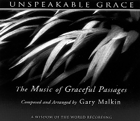From South Africa to Poland, plenty of musical talent seeks to soothe the ears
As we begin another increasingly globally-interconnected year, world music continues to offer a greater variety of refreshing sounds. The following CDs are this critic’s menu for some of the most interesting offerings, even with some imperfections, for 2005.
“No Boundaries”
Heads Up 15
In more than 30 years of performing, South Africa’s a cappella male ensemble Ladysmith Black Mambazo has achieved renown for their tight, sonorous harmonies and uplifting performances. Thanks to their 1986 “Graceland” collaboration with Paul Simon, they achieved the worldwide recognition that led to one much-deserved Grammy Award and seven additional nominations, the most recent in 2004.
Now the singers team up with the strings of the English Chamber Orchestra conducted by Ralf Gothoni for a gorgeous, soulful excursion that mixes original compositions by group founder Joseph Shabalala and album arranger Isak Roux with classics by Mozart, Schubert and Bach.
As improbable as this may sound, the project’s precedent was the boundary breaking “Shabalala,” Simon’s arrangement of “Amazing Grace” that initially catapulted them to fame. Heard here in orchestrated form, “Amazing Grace” joins a beautiful “Jesu, Joy of Man’s Desiring,” a curious, gospel-like “Ave Verum Corpus,” and a Zulu version of Schubert’s “Sanctus,” melding faith and spirit in performances that smack less of crossover than of heart fire.
The group performs at New York’s Town Hall on April 10. Tickets are $25-$45 at ticketmaster.com.

“Pictures from the Street”
Asphalt-Tango Records
Preconceptions of accordion music as trite or limited vanish upon playing this mind-opening disc.
Featuring original compositions by members of Poland’s Motion Trio, the music ranges from up-tempo, high-spirited affairs to others that bubble along in a manner reminiscent of Nino Rota’s music for Fellini. In keeping with South American accordion tradition, there are several original tangos. But there’s also a unique version of the classic folk dance “Aide Jano,” works that show the influence of jazz and rock, and a bonus “Stars” video playable on both PC and Mac.
The video is especially wild, with space music sounds and Philip Glass-like minimalist repetition accompanying equally outré, unabashedly self-promoting images.
The trio has won the Grand Prix at the Fourth Krzysztof Penderecki International Competition of Contemporary Chamber Music in Kraków. Each of its members, ranging in age from 26 to 34, has also won a handful of prizes as a soloist. The years they’ve spent honing their craft on the streets pays off in this stunning recorded début.
“Amor”

EMI
When it comes to amour, high-flying soprano Natalie Dessay’s new recital of opera scenes and lieder—or songs—by Richard Strauss swept me head over heals. From Zerbinetta’s delightful, impossible-to-sing coloratura showpiece from “Ariadne auf Naxos,” complete with a perfect, rarely attempted stratospheric trill, to the two great silver- and pink-hued duets and transcendent trio from Strauss’ great romantic opera “Der Rosenkavalier,” Dessay’s beautiful tone, apt phrasing and infectious spirit illumine Strauss’ soaring melodies with love and joy.
If you’ve ever wondered why some people wax ecstatic over opera, give this CD a listen.
For those who know the music of Strauss only from the thunderous chords of his early tone poem “Also Sprach Zarathustra” played at the opening of the movie “2001,”uncovering his vocal music may bring as much pleasure as opening a gift of expensive chocolate.
The four “Brentano Lieder,” capped by the bubbly “Amor,” are among the composer’s many gifts to the soprano voice of which he was enamored. The “Arabella” duet, originally composed for the very different voiced Lotte Lehmann, combines beauty and nostalgia in Strauss’ inimitable soaring manner.
As for the “Rosenkavalier Trio,” soloists Dessay, Felicity Lott and Angelika Kirschschlager receive such ideal support from Antonio Pappano and the Orchestra of the Royal Opera House Covent Garden that this offering renders laughable a recent, impossibly slow version from the soppy Renée Fleming and the valiant Barbara Bonney and Susan Graham, accompanied by the overly indulgent conductor Christoph Eschenbach.
“Unspeakable Grace”

Wisdom of the World
Called “a masterpiece of healing music” by New Age author Jack Canfield, “Unspeakable Grace” contains music originally composed to accompany the words of wisdom offered by Ram Dass, Elisabeth Kübler-Ross, Thich Nhat Hanh, Rabbi Zalman Schachter-Shalomi and other spiritual teachers in the book/CD combo “Graceful Passages: A Companion for Living and Dying.”
A majority of listeners will undoubtedly receive as much comfort from this music as does Joan Borysenko, who finds it “a deep experience of essence.” Given that “Graceful Passages” offers invaluable support in accepting mortality, and has received glowing endorsements from an imposing array of renowned teachers and musicians—including Larry Dossey, Christiane Northrup, Kenny Loggins and John Robbins—one might expect critical comments only from someone begging for truly bad karma.
But I will dive in nonetheless.
Gary Malkin’s background as a Hollywood professional who has earned seven Emmys and six ASCAP awards for his film and TV music shows through. I could not listen to the opening track, “Letting Yourself Be Loved,” without first seeing two heterosexual lovers bidding each other a final adieu on a seaside cliff, the woman’s scarf and long, perfectly coifed hair blowing in the air during the tearful parting, with an immediate if incongruous segue to an animated clip in which mother tucks her adorable little toy tot into bed and gives him a goodnight kiss on the forehead.
As soothing and meditative as this music may be, its curious intersection of Tinseltown mythology, New Age teaching and a pervasive tendency to homogenize everything, save for heavy metal, hip-hop, and modern classical-experimental fare into major chords, must be acknowledged in any serious consideration of Malkin’s work.

gaycitynews.com



































